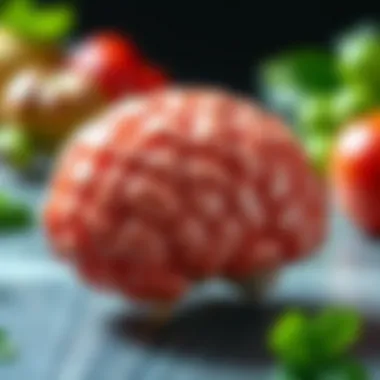Brain Tumor Shrinking Foods: Their Role and Effectiveness


Intro
Brain tumors, though varying widely in type and severity, remain a daunting challenge in the medical world. Recent research suggests that diet might play a role in managing these conditions—it’s not just about what you’re eating, but how certain foods can potentially influence tumor growth. This article aims to unravel the connection between dietary choices and their possible effects on brain tumors, shedding light on specific nutrients and their mechanisms of action.
As we embark on this exploration, we will cover topics including the food groups that appear to aid in shrinking tumors, the research backing these claims, and how everyday choices can coincide with traditional treatments. This discussion is tailored for students, researchers, educators, and professionals who seek to deepen their understanding of nutrition’s impact on brain health and tumor management.
So grab a cup of tea or coffee, settle in, and let’s dive deep into the fascinating world of foods that might hold promise for those navigating through the journey of brain tumors.
Preamble to Brain Tumors
Understanding brain tumors is critical, especially in a world where health-related issues increasingly gain attention. The brain is the command center of the body, and when something goes awry in this intricate organ, the repercussions can be profound. The complexities surrounding brain tumors—ranging from their types to how they manifest—highlight a crucial area of study for not just doctors, but also patients, families, and caregivers. This section aims to shed light on the essentials about brain tumors, which lays the groundwork for discussing how nutrition might play a pivotal role in managing such conditions.
Definition and Types of Brain Tumors
Brain tumors, by definition, are abnormal growths of cells within the brain or surrounding structures. When we talk about brain tumors, we generally categorize them into two main groups: benign and malignant. Benign tumors are non-cancerous and tend to grow slowly, posing less immediate risk than malignant tumors, which are cancerous and can spread to other parts of the brain or even the body.
Types of brain tumors vary widely. Common examples include gliomas, meningiomas, and acoustic neuromas. Gliomas, arising from glial cells, can be particularly aggressive, while meningiomas, often termed as the slow movers of the bunch, emerge from the protective layers covering the brain. This basic understanding gives patients and their loved ones a clearer perspective on the potential challenges they may face when dealing with brain tumors.
Prevalence and Risk Factors
Brain tumors are not everyday conversation topics, but their prevalence might surprise some. In the United States, approximately 700,000 people are living with a primary brain tumor. The risk factors can range from genetic predisposition to environmental components.
While the causes of most brain tumors remain largely unclear, certain risk factors have been identified. For instance, a family history of brain tumors can increase one’s likelihood of developing them. Environmental factors, such as exposure to ionizing radiation and certain chemicals, may also raise the risk. Additionally, age plays a significant role—some tumors are more common in younger populations, while others tend to appear later in life.
Treatment Options and Challenges
Managing brain tumors involves a multifaceted approach. Traditional treatment options often include surgery, radiation therapy, and chemotherapy. Each option brings its own set of challenges. Surgery aims to remove as much of the tumor as possible but may not always be an option depending on the tumor's location or size. Radiation therapy can effectively shrink tumors, yet it comes with risks, such as damage to surrounding healthy brain tissue.
Chemotherapy, while effective in some cases, sometimes fails to cross the blood-brain barrier efficiently, reducing its efficacy. Patients often face tough decisions regarding treatment options, weighing efficacy against potential side effects. Also, the complexity of these treatments can lead to emotional and psychological burdens that deserve to be acknowledged along with the physical aspects.
The Role of Nutrition in Cancer Care
Nutrition plays a pivotal role in the overarching landscape of cancer care. It isn't just about what's on the plate; it's a matter of how those choices can potentially shift the tide in the battle against illness, specifically in the context of brain tumors. A well-balanced diet can complement traditional treatment modalities, empower the immune system, and improve overall quality of life. Moreover, certain foods have demonstrated an ability to possibly influence tumor growth and inflammation, hence making the need for understanding these aspects vital for patients, caregivers, and healthcare providers alike.
Understanding Nutritional Support
Nutritional support is more than simply consuming calories—it's about ensuring the body receives what it needs to repair itself and facilitate recovery. Cancer treatments, particularly chemotherapy and radiation, often lead to side effects such as nausea, loss of appetite, and changes in taste, which can make maintaining nutritional balance challenging.
To address these challenges, healthcare providers often suggest tailored dietary strategies. For example, incorporating high-calorie shakes or soft foods might ensure patients get the nutrients necessary during difficult periods. Foods rich in protein, like chicken, fish, and legumes, are crucial for healing tissues. Additionally, fruits and vegetables, particularly those high in antioxidants, play an essential role in combating oxidative stress caused by both cancer and its treatments.
- Key points to consider:


- Nutritional needs can vary significantly between individuals, and therapies may impose unique dietary restrictions.
- Keeping a food diary can help track what helps or hinders one’s well-being.
- Collaborating with nutritionists can present personalized dietary plans that align with treatment cycles.
Dietary Factors Influencing Tumor Growth
The influence of diet on tumor growth is an area steeped in investigation. The types of food consumed can either support cellular health or foster an environment conducive to tumor proliferation. For instance, high sugar intake may lead to more insulin production, which could stimulate tumor growth. In contrast, a diet rich in fruits, vegetables, and whole grains may help mitigate these risks.
- Specific factors that can influence tumor behavior include:
- Antioxidants: Found abundantly in berries and leafy greens, these compounds help neutralize free radicals, potentially reducing the rate at which cells become malignant.
- Fiber: Foods high in fiber support gut health, which is increasingly recognized as being linked to overall health, including cancer outcomes.
- Fats: A careful selection of fats can matter significanty. Omega-3 fatty acids found in fish, walnuts, and flaxseeds have been noted for their anti-inflammatory properties, which may be beneficial in a tumor context.
By strategically including these elements into diets, alongside traditional medical treatments, there’s a chance to not only aid health but also hopefully exert some control over tumor dynamics. This holistic view of nourishment and its impact on cancer perpetuates the idea that food can be a source of agency in a patient’s experience.
Key Foods for Brain Tumor Management
The significance of selecting the right foods in the context of brain tumor management cannot be overstated. These considerations can profoundly influence not only the progression of tumors but also how patients feel during treatment. Certain foods have been identified to possess unique properties that may help either impede tumor growth directly or bolster the body’s immune system, providing an additional layer of defense against disease.
Understanding which foods contribute to these benefits is crucial for patients, their families, and healthcare practitioners. By integrating these foods into everyday meals, individuals can take an active role in their health journey. The following sections delve into specific categories of food that are recognized for their potential in managing brain tumors.
Mechanisms of Action: How Foods Affect Tumor Cells
Understanding how specific foods influence tumor cells is paramount in navigating the complex landscape of brain tumor management. Nutritional science is now highlighting the intricate relationship between diet and cancer, as certain foods possess properties that can significantly affect tumor behavior. It’s not just about the calories consumed; it's about the quality of those calories and how they contribute to cellular health. Here, we delve into two critical mechanisms: cellular metabolism changes and the impact on angiogenesis.
Cellular Metabolism and Growth Inhibition
When we talk about cellular metabolism in the context of tumors, we enter a realm where the very energy pathways of cancer cells can be manipulated by the food we eat. Cancer cells, unlike healthy cells, often engage in a process called aerobic glycolysis, commonly known as the Warburg effect, where they rely heavily on converting glucose into energy and produce lactic acid even in the presence of oxygen. This unchecked metabolism can accelerate tumor growth and spread.
Foods with a low glycemic index can be potent allies in this battle. For instance, incorporating healthy fats, such as those found in avocados and nuts, might reduce glucose availability to tumors and shift the metabolic balance. Likewise, fiber-rich foods like legumes and whole grains not only support healthy gut function but may also slow down the absorption of glucose, leading to more stable blood sugar levels. Research indicates that when blood sugar is regulated, the fuel supply to aggressive cancer cells diminishes, subsequently inhibiting their growth.
Additionally, specific compounds derived from foods, such as polyphenols in green tea, have been shown to influence mitochondrial function—damaging the energy production machinery of cancer cells.
"By adjusting our dietary habits, we can potentially starve cancer cells of the energy they need to thrive, inviting a glimmer of hope in an otherwise daunting scenario."
Impact on Angiogenesis
Angiogenesis, the process by which new blood vessels form from existing ones, is crucial for tumor growth as it provides oxygen and nutrients. A tumor's ability to develop its own blood supply allows it not only to grow larger but also to metastasize—spreading to other parts of the body. Certain foods can inhibit this process, casting a shadow over tumor development.
Fruits and vegetables are packed with antioxidants and other bioactive compounds that exert anti-angiogenic effects. For example, tomatoes, due to their lycopene content, and berries, rich in flavonoids, have shown promise in scientific studies. These foods may reduce the levels of growth factors that promote blood vessel formation.
Moreover, cruciferous vegetables like broccoli contain sulforaphane, a compound that has been demonstrated to interfere with the angiogenic signaling pathways, significantly curbing the tumor’s ability to secure resources from the host.
In summary, the mechanisms of action elucidate a profound connection between our diet and brain tumor dynamics. Understanding these pathways not only empowers patients and caregivers but also emphasizes the need for further research into dietary interventions as complementary strategies in the fight against cancer. Incorporating foods that can manage cellular metabolism and angiogenesis is a promising avenue worth exploring for anyone engaged in tumor care.


Complementary Approaches: Integrating Diet with Conventional Treatments
When it comes to battling brain tumors, the conversation often centers around treatment regimens like surgery, radiation, and chemotherapy. However, the increasing awareness of the role nutrition plays in health has sparked interest in how dietary choices can complement these traditional methods. This section delves into integrating dietary strategies with conventional treatments, emphasizing their potential benefits and considerations.
Collaborative Strategies with Healthcare Providers
Integrating dietary approaches into a conventional treatment plan is not just advisable; it can be pivotal. Working closely with healthcare providers can ensure that patients make informed nutritional choices tailored to their specific needs. Conversations between patients and their doctors or dietitians can unveil potential dietary interventions that may enhance the efficacy of prescribed treatments. For instance, nutrient-rich foods might modify the body’s response to chemotherapy, potentially mitigating side effects while supporting overall health.
"It's not just about fighting the tumor; it's about supporting the whole self during the journey."
This reflects the importance of a multidisciplinary approach, where nutritional guidance aligns with medical strategies.
Here are some strategies that could help:
- Regular consultations: Frequent meetings with dietitians to adjust dietary plans based on treatment progress.
- Educational resources: Providing patients with literature on brain tumor-friendly foods to silo their choices effectively.
- Support networks: Forming collaborations between healthcare providers to create a more holistic treatment plan.
Introducing healthy fats and anti-inflammatory foods into a meal plan, for instance, could not only fortify the immune system but also create a favourable environment during treatment.
Patient Experiences and Case Studies
Real-life accounts can often highlight the positive effects of dietary changes. Perhaps you’ve heard stories of survivors who credit their gradual recovery not only to medical intervention but also to significant dietary shifts.
Take, for example, a patient named Julia who was diagnosed with a glioblastoma. Under the guidance of her oncologist and a registered dietitian, she committed to an anti-inflammatory diet rich in almonds, leafy greens, and oily fish. Julia reported less fatigue and an improved tolerance to her chemotherapy sessions. This isn’t an isolated case; other patients have similarly benefitted from dietary adjustments, underscoring a potential synergy between diet and conventional medicine in combating brain tumors.
In another instance, Mark, who followed a nutrition plan emphasizing antioxidants from berries, showed remarkable resilience against side effects that commonly accompany radiation. His journey exemplifies how tailored meals can maintain energy levels and enhance well-being during taxing treatment phases.
These anecdotes affirm that food can serve more than nourishment—it can be a tactical ally in the fight against brain tumors. Moreover, they emphasize the necessity of collaboration between patients and healthcare professionals when implementing these dietary modifications.
In summarizing these integrative approaches, it becomes clear that complementary strategies offer hope for those affected by brain tumors, reinforcing the notion that diet and treatment are not mutually exclusive but rather partners in pursuit of better health.
Emerging Research and Future Directions
The exploration of how diet influences brain health and tumor management is an emerging field that holds considerable promise. As new studies accumulate, they reveal not only the potential benefits of certain foods but also guide future interventions that can be tailored to patients' unique needs. Understanding the significance of nutritional approaches helps pave the way for integrating these findings into conventional treatment protocols, potentially leading to improved patient outcomes.
Recent Studies on Dietary Interventions
Accumulating evidence highlights the role of various dietary interventions in managing brain tumors. Recent studies have indicated that specific nutrients can influence tumor behavior significantly.
For instance, a study published in the Journal of Neuro-Oncology linked high intake of antioxidant-rich foods like berries and dark chocolate to a decreased risk of tumor progression. Participants who incorporated these foods into their diets demonstrated not only improved overall health but also showed a slower growth rate of tumors. This correlation emphasizes the need for ongoing research to identify optimal dietary patterns.
Moreover, a 2023 randomized trial explored the effects of a Mediterranean diet on patients undergoing treatment for glioblastoma. This diet, rich in healthy fats, grains, and vegetables, was associated with lesser side effects from treatments and an increase in the quality of life among participants. Such findings not only foster hope but also ignite further inquiries into how dietary patterns can mitigate the adverse effects of aggressive treatments.
"Dietary interventions could be a game-changer in the management of brain tumors, offering supportive treatment options that empower patients rather than simply enduring standard protocols."


Potential for Targeted Nutritional Therapies
As research evolves, the concept of targeted nutritional therapies is gaining traction. Tailoring dietary recommendations based on specific tumor characteristics and patient genetics could enhance treatment efficacy. The goal is to develop a personalized dietary framework that aligns not just with individual health needs, but also with the biology of the tumor.
For example, studies like those from Clinical Cancer Research suggest that combining traditional therapies with prescribed diets could enhance drug efficacy. One promising avenue of investigation is the ketogenic diet, which has received attention for its potential to starve cancer cells of the glucose they need to thrive. This dietary shift could lead to a multi-faceted approach to treatment, where nutrition plays a central role in managing the disease.
In light of these studies, physicians are beginning to consider how to incorporate nutritional therapy into clinical trials and treatment regimens. As this field advances, further research will be pivotal in transforming dietary recommendations from general advice to precise, personalized medical interventions.
Ultimately, the intersection of diet and brain tumor management is an area ripe for exploration. It promises not just to enhance patient care but also to empower individuals in their journeys toward recovery. More investment in this research could yield significant breakthroughs, making dietary interventions an integral part of comprehensive cancer care strategies.
Practical Guidelines for Incorporating Brain Tumor Shrinking Foods
In the journey of understanding how diet can impact brain tumor management, it is crucial to establish practical guidelines for incorporating brain tumor shrinking foods into daily life. Falling into a routine of eating nutrient-rich foods can be more empowering than it may seem. The right foods not only provide essential nourishment but also support overall health and mental well-being during treatment. Here are some tips to effectively incorporate these foods into your routine:
Creating Balanced Meal Plans
When it comes to crafting meal plans, balance is key. A well-rounded diet can strengthen your body’s resilience and may aid in tumor management. The foundation of a balanced meal includes a variety of nutrients.
- Include Colorful Vegetables: Vegetables like bell peppers and carrots are not just eye-catching; they are also packed with necessary vitamins and minerals. Each color usually represents different benefits. For instance, dark leafy greens like kale are high in calcium and antioxidants.
- Incorporate Whole Grains: Swap out refined grains for whole options such as brown rice and quinoa. They provide fiber, which is essential for digestion and may also play a role in managing inflammation.
- Source Lean Proteins: Choose proteins like chicken, fish, or legumes. These sources can support muscle repair and overall vitality, aiding your body as it battles illness.
- Healthy Fats are Key: Using olive oil or avocado oil instead of butter can add flavor while also boosting your intake of healthy fats. These fats are important for brain health.
- Mindful Portions: Paying attention to portion sizes can also affect how you feel. Eating smaller, more frequent meals can help sustain your energy level throughout the day.
By integrating these components thoughtfully, meal planning shifts from a chore to a chance for creativity and exploration.
Supplementing with Care
While whole foods should form the bulk of nutrition, dietary supplements can sometimes offer additional support when used thoughtfully. Understanding how to select and use supplements properly is as significant as choosing foods themselves.
- Consult Professionals: Before starting any supplement regimen, it’s wise to consult with a healthcare provider. Professional guidance ensures that the chosen supplements won’t interfere with treatments or other medications.
- Focus on Quality: Not all supplements are made equal. Research or inquire about brands known for quality. Products with 3rd party testing and transparency in their ingredient sourcing often offer more reliability.
- Timing Matters: Sometimes, timing your supplements with meals can enhance absorption. For instance, fat-soluble vitamins like A, D, E, and K should be consumed with food that contains fat to ensure maximum absorption.
- Be Aware of Interactions: Certain supplements can counteract medications or treatments. It’s critical to be aware of any potential interactions. Keeping an open line of communication with healthcare professionals might mitigate unintended consequences.
Navigating dietary supplements thoughtfully can provide an extra edge in the effort to manage brain tumors.
"Incorporating brain tumor shrinking foods goes beyond merely eating better; it involves crafting a lifestyle that supports healing and overall wellness."
Growing understanding about diet in cancer treatment does not stop at personal experience. Resources like the American Cancer Society (www.cancer.org) and peer-reviewed studies listed on Google Scholar are invaluable for staying updated. Resources from universities, including articles on PubMed, can also provide robust information to fortify your dietary choices with evidence.
Remember, the journey may be long, but informed choices can lay the groundwork for healthier living and better quality of life.
Culmination: The Interplay of Diet and Health
The relationship between diet and health, particularly in the context of brain tumors, cannot be overstated. The journey we embark upon when examining brain tumors reveals not only the complexities of cancer but also the significant impact that food can have on our well-being. This article has meticulously navigated through various foods that hold potential for shrinking tumors, unraveling the science behind nutrients that can bolster our defenses against these formidable adversaries.
First and foremost, understanding that certain foods possess anti-inflammatory properties is vital. For instance, incorporating ingredients like turmeric into our daily diet can be a simple yet powerful strategy. Such foods don’t just fill your plate; they can be a significant player in altering cellular functions, utilizing their potent bioactive compounds to potentially reduce tumor size. The role of omega-3 fatty acids from sources like salmon or flaxseed also can't be brushed off. These fatty acids are a boon for brain health and support a well-functioning immune system skilled at fighting cancer.
Moreover, the interplay of diet and health encompasses a holistic approach—one that considers lifestyle modifications as vital complements to traditional treatments. The synergy between what we eat and how we manage stress, exercise, and sleep creates a well-rounded framework for better health. Just like threading a needle, all aspects must come together to ensure a functioning system.
"Nutritious diets are not merely about eating well; they're also about healing the body in profound ways."
For students and professionals researching these connections, it’s significant to delve into emerging studies that validate these dietary interventions. Knowledge is evolving, and keeping up with cutting-edge research can pave the way toward more targeted and effective nutritional therapies. Recent explorations into the biochemical pathways that certain foods influence show promise.
For additional insights on nutritional strategies for cancer management, check resources like the American Cancer Society at https://www.cancer.org and the National Institutes of Health at https://www.nih.gov.







